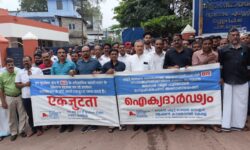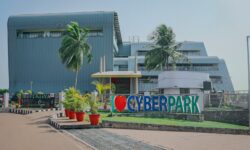KOZHIKODE:
IIM Kozhikode (IIMK) hosted a guest lecture by Arvind Datar, Senior Advocate, Supreme Court of India on Corporate Fraud – Penalizing the honest & rewarding the guilty. The talk was organised in memory of Late Nani A. Palkhivala, the noted economist and jurist. Datar introduced some facets of life of Late Nani A. Pa lkhivala, chronicling his path to success and his notable achievements.
lkhivala, chronicling his path to success and his notable achievements.
Datar introduced the audience to some finer aspects of Corporate Frauds, explaining that cases with more than two years of punishment are generally treated as warrants cases and hence require a long procedure which involves examining witnesses and evidence to frame charges even before the trial begins. Since economic offences are mostly document based and may not always require examining witnesses, he proposed that they be made summons cases which would result in faster prosecutions. With specific reference to the high profile Sahara case, Shri Datar explained that the crux of the case is about deciding whether Optional Fully Convertible Debentures (OFCDs) are public offerings as argued by SEBI or private placements as claimed by Sahara. He clarified that the the Supreme Court sent Subroto Roy to jail not because he has been found guilty but to ensure that his company refunds the money that is due to the OFCD investors. However Shri Datar clarified that a corporate fraud is perpetrated when at the time of collecting money there is an intent to default, but in many cases the intent is not to default but business conditions have forced a company to close. In such cases the authorities sometimes impose provisions of the Prevention of Money Laundering Act (PMLA), which may not be appropriate.
Moving on to other issues, Datar expressed his strong reservations on the GST law and highlighted several challenges that lie ahead for the legislation. He mentioned that between CGST, SGST and IGST, there are expected to be over 31 tax regimes in 29 different states. He pointed out that despite having GST we will continue with excise and sales taxes for some products like petrol, diesel, ATF and tobacco. These exemptions and multiple rates for different products will complicate the tax structure and the widely claimed simplification from the move to GST may not materialise. He also questioned the relatively high Revenue Neutral Rate of 18% as in arriving at the figure the government did not account for the broadening of the tax base and simply accounted the loss in revenue from the current tax base. On Section 377 of the IPC relating to criminalisation of homosexuality, Shri Datar mentioned that it is a very old law dating back to 1860 and should be revised in line with changed thinking on what constitutes unnatural acts. On the controversy over the National Judicial Appointments Commission, he highlighted a problem with the current proposal of having six members as there could be deadlocks in decision making in case of a tie.
At the end of his talk, a vote of thanks was delivered and a memento was presented to Datar by Prof. Rudra Sensarma, Chairperson, Research Office, IIM Kozhikode.



